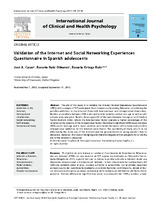Mostrar el registro sencillo del ítem
Validation of the Internet and Social Networking Experiences Questionnaire in Spanish adolescents
| dc.contributor.author | Casas, José A. | |
| dc.contributor.author | Ruiz Olivares, Rosario | |
| dc.contributor.author | Ortega Ruiz, Rosario | |
| dc.date.accessioned | 2021-03-18T07:59:38Z | |
| dc.date.available | 2021-03-18T07:59:38Z | |
| dc.date.issued | 2013 | |
| dc.identifier.uri | http://hdl.handle.net/10396/21202 | |
| dc.description.abstract | The aim of this paper is to validate the Internet Related Experiences Questionnaire (IREQ) with a sample of 525 participants from Compulsory Secondary Education, considering the possible addiction to the internet from both interpersonal and intrapersonal dimensions. Besides, associations between CERI scores and several variables such as sex, age as well as selfesteem were analyzed. Results show a good fit of the questionnaire through a Confirmatory Factor Analysis (CFA), where the interpersonal factor explains a higher percentage of the variance at the expense of the intrapersonal factor. Statistically significant differences between IREQ scores and age and a lineal positive association between self-esteem and possible interpersonal addiction to the internet were found. The possibility of these results to be affected by the social use of the Internet and the generalization in young people's lives is discussed. Moreover, the need of designing and implementing prevention programs for a healthy use of the internet is discussed. | es_ES |
| dc.description.abstract | El objetivo de este trabajo es validar el Cuestionario de Experiencias Relacionadas con Internet (CERI) con una muestra de 525 sujetos escolarizados en Educación Secundaria Obligatoria (ESO), a partir del cual se valora la posible adicción a Internet desde una dimensión intrapersonal e interpersonal. Además, se han relacionado las puntuaciones del CERI con variables como el sexo, la edad, así como la autoestima. Los resultados muestran un buen ajuste del cuestionario mediante un análisis factorial confirmatorio, donde el factor interpersonal explica un mayor porcentaje de la varianza en detrimento del factor intrapersonal. Existen diferencias significativas entre la puntuación del CERI y la edad, y también una relación lineal positiva entre la autoestima y la posible adicción interpersonal a Internet. Se discute la posible influencia en estos resultados del uso social de Internet y su generalización en la vida de los jóvenes, junto con la necesidad de diseñar e implementar programas de prevención para un uso saludable de la conexión a Internet. | es_ES |
| dc.format.mimetype | application/pdf | es_ES |
| dc.language.iso | eng | es_ES |
| dc.publisher | Elsevier | es_ES |
| dc.rights | https://creativecommons.org/licenses/by-nc-nd/4.0/ | es_ES |
| dc.source | International Journal of Clinical and Health Psychology 13, 40-48 (2013) | es_ES |
| dc.subject | Addiction to the Internet | es_ES |
| dc.subject | Interpersonal relationship | es_ES |
| dc.subject | Social networking | es_ES |
| dc.subject | Self-esteem | es_ES |
| dc.subject | Instrumental study | es_ES |
| dc.subject | Adicción a Internet | es_ES |
| dc.subject | Relaciones interpersonales | es_ES |
| dc.subject | Redes sociales | es_ES |
| dc.subject | Autoestima | es_ES |
| dc.subject | Estudio instrumental | es_ES |
| dc.title | Validation of the Internet and Social Networking Experiences Questionnaire in Spanish adolescents | es_ES |
| dc.type | info:eu-repo/semantics/article | es_ES |
| dc.relation.publisherversion | http://dx.doi.org/10.1016/S1697-2600(13)70006-1 | es_ES |
| dc.rights.accessRights | info:eu-repo/semantics/openAccess | es_ES |

